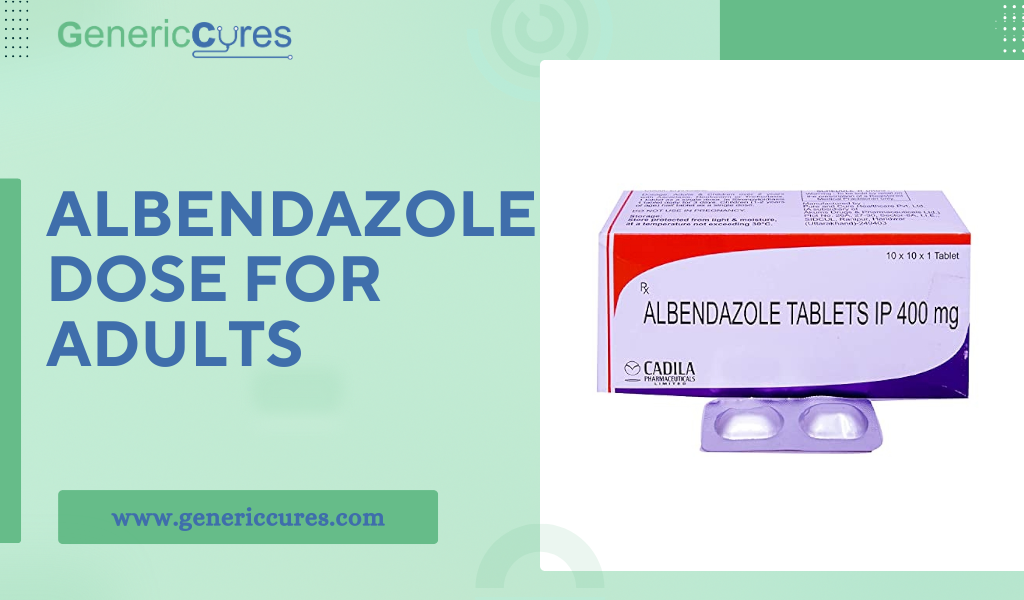Albendazole Dose for Adults: Complete Guide to Usage, Safety & Effectiveness

Albendazole is a widely prescribed antiparasitic medication used to treat a variety of worm infestations in humans. It is known for its broad-spectrum action and is commonly used across the globe, especially in areas where parasitic infections are prevalent.
In this article, we will focus on the recommended Albendazole dose for adults, its usage, safety, and other crucial information. Whether you’re a patient looking to understand your prescription or a caregiver aiming to stay informed, this detailed guide has you covered.
What is Albendazole?
Albendazole is an anthelmintic drug, meaning it’s used to kill parasitic worms in the body. It is especially effective against:
- Roundworms (Ascaris)
- Hookworms
- Tapeworms (including cysticercosis and hydatid disease)
- Pinworms
- Strongyloides
- Giardia (off-label in some cases)
This medication works by inhibiting the parasites’ ability to absorb glucose, effectively starving and killing them over time.
Why Is Albendazole Prescribed?
Albendazole is typically prescribed when:
- You’ve been diagnosed with intestinal or tissue-related parasitic infections.
- You’ve returned from travel to a region where parasitic worms are endemic.
- As part of a deworming program in regions with poor sanitation.
- In mass treatment campaigns in schools and communities.
It’s also used for neurocysticercosis, a severe parasitic brain infection caused by the pork tapeworm.
Albendazole Tablet 400 mg Dose for Adults
When it comes to Albendazole tablet 400 mg dose for adults, the standard regimen depends on the type of parasite being treated. Here’s how it typically breaks down:
Common Doses Based on Infection Type:
| Condition | Albendazole Dose | Duration |
|---|---|---|
| Intestinal worms (e.g., roundworm) | 400 mg single dose | One-time only |
| Hookworm or pinworm | 400 mg once | One-time only |
| Strongyloides or Tapeworm | 400 mg once daily | 3 days |
| Neurocysticercosis | 400 mg twice daily (with food) | 8–30 days (based on severity) |
| Hydatid disease | 400 mg twice daily (with meals) | 28 days, repeated in cycles |
Always consult a healthcare professional before starting Albendazole or modifying the dose.
Albendazole Adult Dose: Factors That Influence It
The Albendazole adult dose can vary depending on several factors:
- Age and weight: While adults typically receive 400 mg, dosage may be adjusted for elderly patients or those with low body weight.
- Type and severity of infection: More serious infections like neurocysticercosis or hydatid disease require longer and higher doses.
- Co-existing conditions: Liver issues may necessitate monitoring or dose adjustments.
- Concurrent medications: Drug interactions with steroids or antiepileptics may affect effectiveness.
Doctors may also recommend additional courses of treatment or follow-up stool tests to ensure the infection has cleared.
How to Take Albendazole Properly
Proper usage ensures the medication works effectively and reduces the chance of side effects.
General Tips for Use:
- Take with food: Fatty meals increase absorption.
- Stick to the schedule: If prescribed for multiple days, do not skip doses.
- Do not crush tablets unless your doctor advises it.
- Complete the full course even if symptoms disappear.
Also, drinking plenty of water and maintaining hygiene is essential to avoid reinfection.
Side Effects to Watch Out For
Albendazole is generally safe when taken as prescribed, but some side effects may occur:
Common Side Effects:
- Headache
- Nausea
- Abdominal pain
- Dizziness
Rare but Serious Effects:
- Liver enzyme elevation
- Bone marrow suppression
- Allergic reactions
If you experience yellowing of the eyes, unusual bleeding, or persistent fever, seek medical help immediately.
Regular blood tests may be recommended for long-term treatment to monitor liver function and blood counts.
Who Should Avoid Albendazole?
Albendazole should be avoided or used cautiously in the following scenarios:
- Pregnancy: Especially in the first trimester. It can harm fetal development.
- Liver disease: Needs dose adjustment or monitoring.
- Known hypersensitivity to Albendazole or similar drugs.
Women of childbearing age are often advised to use effective contraception during and after treatment due to potential teratogenic effects.
Drug Interactions and Precautions
Some medications may interfere with Albendazole’s action, such as:
- Dexamethasone: Can increase drug levels in the blood.
- Cimetidine: May enhance Albendazole absorption.
- Anticonvulsants: Can reduce its effectiveness.
Make sure your doctor knows your complete medication list, including supplements and over-the-counter products.
Can Albendazole Be Used for Preventive Deworming?
Yes. In areas with high parasitic prevalence, public health campaigns often recommend deworming every 6 months for both children and adults.
Taking 400 mg as a single dose every 6 months is common in community settings. However, this should always be done under medical or governmental health guidelines.
Final Thoughts
Albendazole remains one of the most trusted and effective solutions for treating parasitic infections in adults. Understanding the correct dosage and following medical advice are key to successful treatment and preventing reinfection.
Whether you are treating a confirmed worm infestation or taking it as a preventive measure in a high-risk area, knowing the proper Albendazole tablet 400 mg dose for adults can make a significant difference in health outcomes.
For safe and affordable medication options, including Albendazole, visit Genericcures—a platform committed to quality, convenience, and care.





